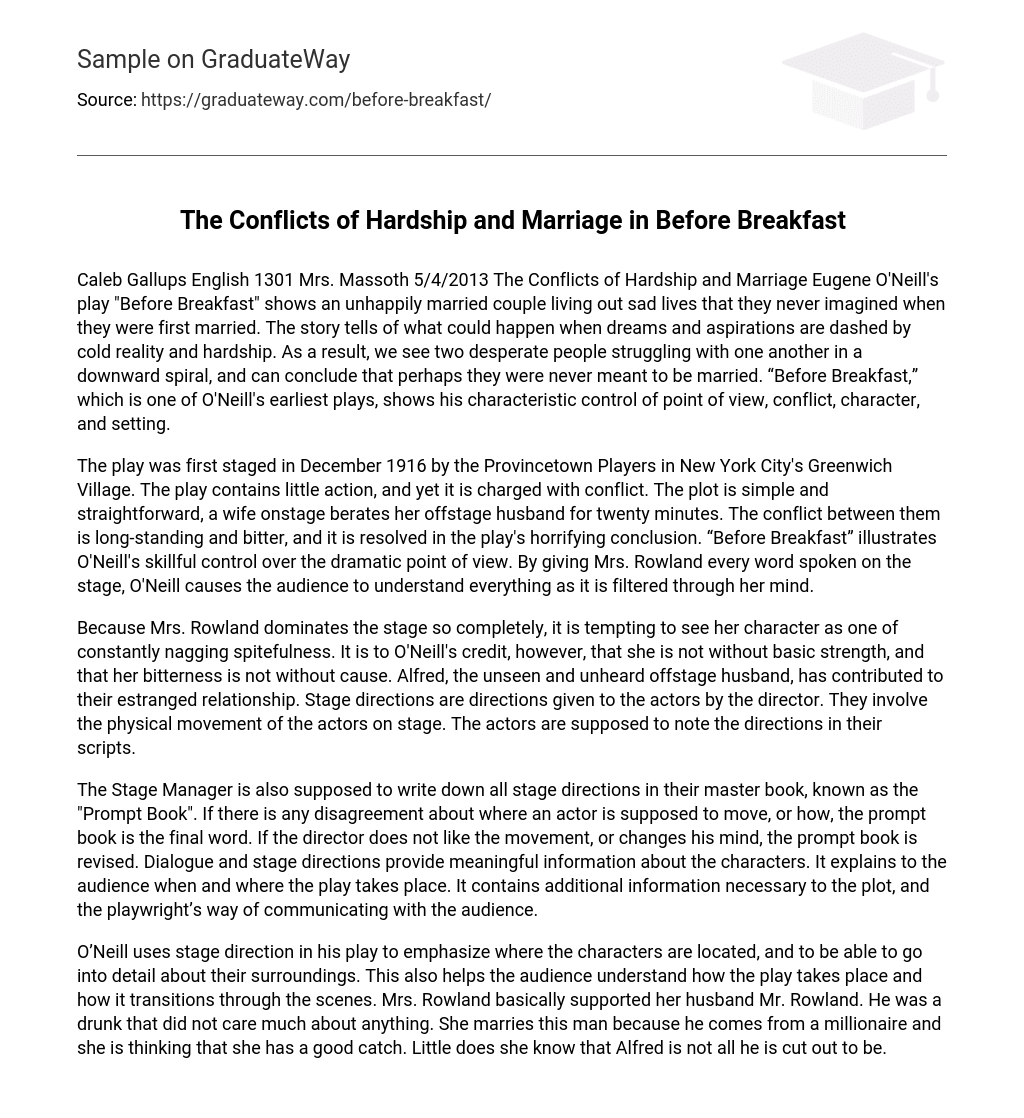The Conflicts of Hardship and Marriage Eugene O’Neill’s play “Before Breakfast” shows an unhappily married couple living out sad lives that they never imagined when they were first married. The story tells of what could happen when dreams and aspirations are dashed by cold reality and hardship. As a result, we see two desperate people struggling with one another in a downward spiral, and can conclude that perhaps they were never meant to be married. “Before Breakfast,” which is one of O’Neill’s earliest plays, shows his characteristic control of point of view, conflict, character, and setting.
The play was first staged in December 1916 by the Provincetown Players in New York City’s Greenwich Village. The play contains little action, and yet it is charged with conflict. The plot is simple and straightforward, a wife onstage berates her offstage husband for twenty minutes. The conflict between them is long-standing and bitter, and it is resolved in the play’s horrifying conclusion. “Before Breakfast” illustrates O’Neill’s skillful control over the dramatic point of view. By giving Mrs. Rowland every word spoken on the stage, O’Neill causes the audience to understand everything as it is filtered through her mind.
Because Mrs. Rowland dominates the stage so completely, it is tempting to see her character as one of constantly nagging spitefulness. It is to O’Neill’s credit, however, that she is not without basic strength, and that her bitterness is not without cause. Alfred, the unseen and unheard offstage husband, has contributed to their estranged relationship. Stage directions are directions given to the actors by the director. They involve the physical movement of the actors on stage. The actors are supposed to note the directions in their scripts.
The Stage Manager is also supposed to write down all stage directions in their master book, known as the “Prompt Book”. If there is any disagreement about where an actor is supposed to move, or how, the prompt book is the final word. If the director does not like the movement, or changes his mind, the prompt book is revised. Dialogue and stage directions provide meaningful information about the characters. It explains to the audience when and where the play takes place. It contains additional information necessary to the plot, and the playwright’s way of communicating with the audience.
O’Neill uses stage direction in his play to emphasize where the characters are located, and to be able to go into detail about their surroundings. This also helps the audience understand how the play takes place and how it transitions through the scenes. Mrs. Rowland basically supported her husband Mr. Rowland. He was a drunk that did not care much about anything. She marries this man because he comes from a millionaire and she is thinking that she has a good catch. Little does she know that Alfred is not all he is cut out to be. Just because you have money does not mean that your life is going to be happy.
One part of the story, she is yelling his name “Alfred” a million times and he does not answer her. Alfred had no respect for his wife. She supported him while he went out and got drunk and had affairs but she still stuck by him. Alfred does not really care much about his life. In the end it appears that Alfred hangs himself. If the couple were not married in the first place, there is a good chance that this unfortunate ending would have never taken place. Perhaps they would have all lived happily ever after, separately, instead of being subject to one another.
Reference
- Before Breakfast, By Eugene O’Neill. (1969, December 31). In DirectEssays. com. Retrieved 18:24, May 06, 2013, from http://www. directessays. com/viewpaper/102243. html
- EssayMania. com. Retrieved on 06 May, 2013 from http://essaymania. com/70610/before-breakfast
- Smith, Susan Harris (1984). Masks in Modern Drama. Berkeley: University of California Press. pp. 66–70, 106–08, 131–36, index S124. ISBN 0-520-05095-9.
- “Eugene O’Neill Dies of Pneumonia; Playwright, 65, Won Nobel Prize”. The New York Times. Retrieved August 13, 2011.





